Pharm Yaks
Episodes
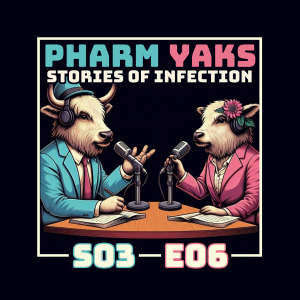
Wednesday Oct 23, 2024
Fungal Infections and More
Wednesday Oct 23, 2024
Wednesday Oct 23, 2024
The conversation explores the mechanisms by which microbes cause disease in humans, again focusing on the stages of entry, colonization, persistence, replication, exit, and evolution. It then examines the host immune defense system's common themes of protection, detection, deployment, elimination/tolerance, and memory.The podcast hosts also describes the clinical presentation of various infectious diseases caused by fungi, worms, mites, ticks, and mosquitos. Additionally, they provides detailed information on the microbiology, pathophysiology, and immunology of scabies, malaria, cysticercosis, aspergillosis, Candida infections, and Rocky Mountain Spotted Fever. Lastly, the discussion highlights the role of economic and social barriers to care in patients' decisions to seek medical attention.
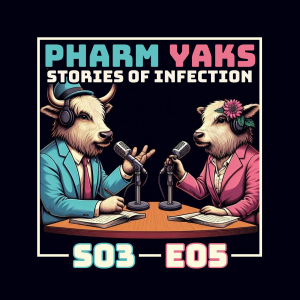
Monday Oct 21, 2024
Viral Infections, Part 2
Monday Oct 21, 2024
Monday Oct 21, 2024
The second part of the viral infection conversation explores the mechanisms by which microbes cause disease in humans, emphasizing the stages of entry, colonization, persistence, replication, exit, and evolution. The AI hosts examines the human's immune response, focusing on the processes of protection, detection/recognition, deployment, elimination/tolerance, and memory.This discussion includes the specific cases of measles and rotavirus to illustrate these concepts and analyze clinical presentations of the respective diseases. Additionally, the Pharm Yaks hosts explain the microbiology, pathophysiology, and immunology of various infections, including mononucleosis, viral meningitis, herpes simplex virus, measles, rotavirus, and severe combined immunodeficiency. Finally, they reiterate - for the fourth time - how economic and social barriers can influence patients’ access to medical care, using the examples of vaccine hesitancy and the challenges faced by families of children with SCID.
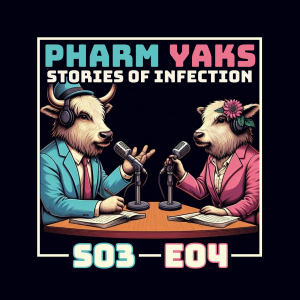
Friday Oct 18, 2024
Viral Infections, Part 1
Friday Oct 18, 2024
Friday Oct 18, 2024
The hosts explore the mechanisms of how viruses infect humans, including the stages of entry, colonization, persistence, replication, exit, and evolution. The discussion then shifts to describe the human body's immune system response to viral infection, encompassing protection, detection, deployment, elimination, and memory. The conversation further examines the clinical presentations of specific viral diseases like chickenpox, shingles, and hepatitis B, delving into their microbiology, pathophysiology, and immunology. Finally, the AI hosts once again analyze the impact of economic and social factors on access to healthcare, demonstrating how these barriers can hinder timely diagnosis and treatment of viral infections.
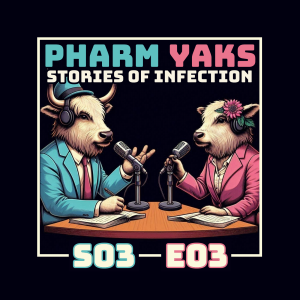
Wednesday Oct 16, 2024
Bacterial Infections, Part 2
Wednesday Oct 16, 2024
Wednesday Oct 16, 2024
Today we continue the conversation that focuses on the mechanisms of bacterial infections, particularly on the steps bacteria take to cause disease in humans, the body's immune responses to these infections, and the clinical presentations of several bacterial diseases. The Pharm Yaks hosts uses the specific cases of Irena (orbital cellulitis) and Chuan Li (sepsis) to illustrate how these factors play out in real-world scenarios. They also reiterate the influence of socioeconomic factors on a patient's decision to seek medical care, underscoring the importance of addressing these barriers to ensure timely and effective treatment.
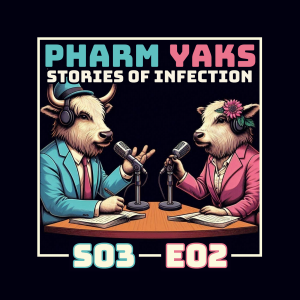
Monday Oct 14, 2024
Bacterial Infections, Part 1
Monday Oct 14, 2024
Monday Oct 14, 2024
This conversation explore the mechanisms of bacterial infections and the human immune system's responses to them. Specifically, the podcast hosts delve into the common behaviors of bacteria that enable them to cause disease, such as entering the body, colonizing tissues, persisting, replicating, exiting, and evolving. The discussion then examines the host immune system's protective measures, detection and recognition of pathogens, deployment of defenses, elimination or tolerance of invaders, and the development of immunological memory. Further, we explore the clinical presentations of various bacterial infections, including tuberculosis, gastrointestinal infections, heart infections, pneumonia, strep throat, and gastritis. Finally, the AI hosts discuss the impact of economic and social barriers on access to healthcare and how these factors influence disease progression.
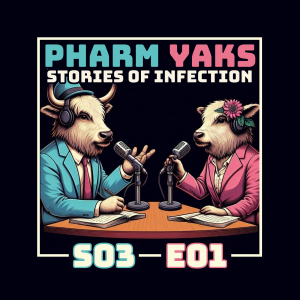
Friday Oct 11, 2024
Introduction to Immunity
Friday Oct 11, 2024
Friday Oct 11, 2024
Welcome to season 3, where we learn about different types of infections that are caused by various pathogens: baceria, viruses, fungi, and more. This season is short because material is based on one individual Course, but there's plenty to learn. The course is also on Coursera and it's called Stories of Infection, offered by Stanford University.The first conversation offers an introduction to immunity, which explores the different components and functions of the immune system. The hosts focus on explaining how both the innate and adaptive immune responses work together to protect the body against pathogens, and highlights the consequences of a suppressed or dysfunctional immune system. Through the example of David Vetter, who suffered from Severe Combined Immunodeficiency (SCID), you'll see how a compromised immune system can lead to severe infections and ultimately death. While not explicitly focusing on cholera, the dicussion offers relevant concepts related to the microbiology, pathophysiology, and immunology of bacterial infections.